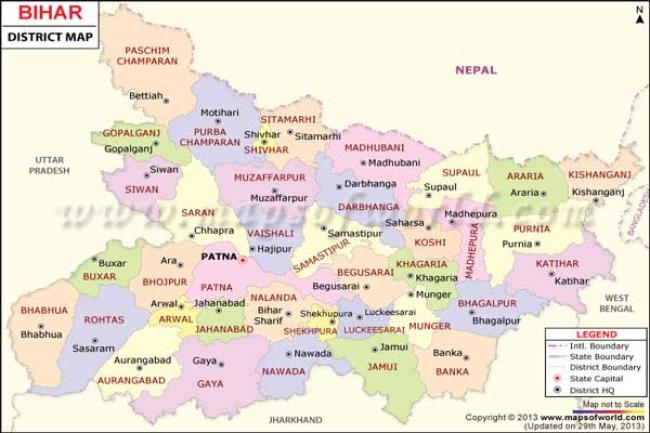Mrinal Kanta Das. Research Assistant, Institute for Conflict Management 14 Jun 2016, 06:37 am Print

wikipedia commons
On May 25, 2016, CPI-Maoist cadres killed two persons at Duaath village in Gaya District. The slain persons were identified as Sudesh Paswan, Dumaria Block (rural administrative unit) president of the Lok Janshakti Party (LJP). The other victim was Sunil Paswan, a cousin of the slain LJP leader. The Maoists on June 2, 2016, claiming responsibility for the incident, alleged that Sudesh was the 'ring leader of Police informers'.
On May 21, 2016, the Maoists killed three villagers at Gadi village in the Chakai area of Jamui District. Their bodies were recovered by the Police on May 22. In a hand written pamphlet, the Maoists claimed that they were 'Police informers' who facilitated the encounter killing of their leader Ram Chandra Mahto aka Pramod aka Chirag Da in Jamui District on January 29, 2016. Chirag was a 'special area committee' member of Northeast Bihar and North Jharkhand Special Area Committee carrying two rewards - INR 2.5 million announced by Jharkhand Government and INR 0.5 million declared by Bihar Government.
Incidentally, these three Districts - Aurangabad, Gaya and Jamui - remain the epicenter of Maoist-violence in Bihar. According to partial data compiled by the South Asia Terrorism Portal (SATP), 14 persons, including seven civilians, two SF personnel and five Maoists, have been killed in the State during the current year (data till June 12, 2016); of which 13 fatalities, including all seven civilians, one of two SF troopers and five Maoists have been reported from these three Districts alone.
Since the formation of the CPI-Maoist on September 21, 2004, Bihar has accounted for at least 632 Maoist-linked fatalities, including 284 civilians, 175 SF personnel and 173 Maoists. Of these, 269 fatalities (42.56 per cent of the total), including 140 civilians, 79 SF personnel and 50 Maoists, were recorded in these three Districts. The region has been highly insecure for the civilian populace in terms of Maoist violence, with 49.29 per cent of total civilian fatalities recorded in such violence during this entire period (since September 21, 2004) located in these Districts alone.
Apart from the CPI-Maoist, the Tritiya Prastuti Committee (TPC), a Maoist splinter group operating out of Jharkhand, has also made its presence felt in the region. Aurangabad-Gaya-Jamui, in fact, have been the ground for a turf war between the Maoists and the TPC cadres. According to the SATP database, at least four TPC cadres and three Maoists have been killed in six separate incidents of fratricidal killing since 2004. TPC cadres have also targeted Police and civilians in the region, with four such incidents recorded thus far. In the current year, on January 3, 2016, TPC cadres assaulted two persons, identified as Ramvilas Ram and Ramdeep Ram, 70-year-old father and brother, respectively, of a sarpanch (head of panchayat, village level local self-Government institution) in Aurangabad District. The fear of a TPC backlash prevented the sarpanch Ramji Ram from lodging a Police complaint after the assault. The sarpanch said TPC cadres had demanded 20 per cent of the grant sanctioned by the Government for welfare schemes in his panchayat.
Unsurprisingly, Aurangabad, Gaya and Jamui are among the 35 worst Naxal-[Left-Wing Extremism (LWE)] - affected Districts identified by the Union Ministry of Home Affairs (UMHA) across the country.
These three Districts are strategically located and close to the border with Jharkhand, another severely Maoist-affected State. The Garwah, Palamu, Chatra, Hazaribagh, Koderma and Giridih Districts of Jharkhand, all LWE-affected, share borders with these three Districts in Bihar. In the current year, Jharkhand has thus far accounted for 36 LWE-linked fatalities, including 11 civilians, eight SF personnel and 17 Maoists.
Backwardness, poverty and poor governance continue to create pools of potential violence in this region, and the Maoists have been quick to tap into these reserves. A joint survey conducted by the US-India Policy Institute and the New Delhi based Centre for Research and Debates in Development Policy found that among 599 Districts across India under the purview of the survey, Jamui ranked near the bottom, at 587; Gaya, 562nd and Aurangabad, 557th. The report took composite development - measured in terms of economic development and the indices of health, education and material well-being - into consideration, and was released on January 29, 2015. According to the Annual Health Survey 2011-12, Bihar, the institutional delivery rate in Gaya and Jamui are 42.8 and 42.9 per cent, respectively, as against the State average of 51.9 per cent.
Bihar has seen continuous and positive developments in its counter-insurgency campaigns through 2014 and 2015, though these have been periodically undermined by political indecision and ambivalence. The lack of political direction has brought misery to the region, and particularly to its worst LWE-afflicted Districts. It is imperative that a clear political will enables and reinforces SF operations to bring enduring peace and stability to the remaining areas of LWE influence in the State.
- Pakistan: Police recover two bullet-ridden bodies from Balochistan
- IDF strikes Hezbollah targets in Lebanon after projectile fire toward Northern Israel; 31 killed
- Pakistan: Armed gunmen kidnap 14 workers during coordinated raids in Balochistan
- ISIS-inspired plot foiled in UK: Two men get life sentences for targeting Jewish community
- India rejects allegations, urges Pakistan to tackle its ‘home-grown ills’





-1763561110.jpg)
